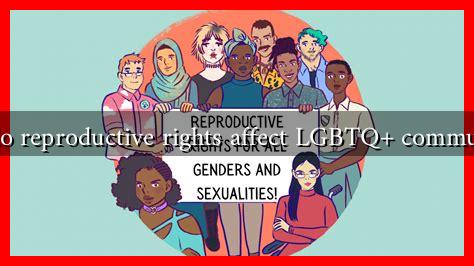-
Table of Contents
How Do Reproductive Rights Affect LGBTQ+ Communities?
Reproductive rights are a critical aspect of human rights that encompass the ability to make informed choices about one’s reproductive health. For LGBTQ+ communities, these rights are not just about access to contraception or abortion; they also intersect with issues of identity, family planning, and healthcare access. This article explores how reproductive rights impact LGBTQ+ individuals and families, highlighting the unique challenges they face and the importance of inclusive policies.
The Intersection of Reproductive Rights and LGBTQ+ Identities
Reproductive rights are often framed within the context of heterosexual relationships, but they are equally vital for LGBTQ+ individuals. The ability to make choices about reproduction is essential for many in the LGBTQ+ community, particularly those who wish to start families. Here are some key areas where reproductive rights intersect with LGBTQ+ identities:
- Family Planning: Many LGBTQ+ individuals and couples seek to have children through various means, including adoption, surrogacy, and assisted reproductive technologies (ART). Access to these options is often limited by legal and financial barriers.
- Healthcare Access: LGBTQ+ individuals frequently face discrimination in healthcare settings, which can hinder their access to reproductive health services. This discrimination can lead to inadequate care and a lack of information about reproductive options.
- Legal Recognition: The legal landscape surrounding LGBTQ+ rights varies significantly by region. In some areas, same-sex couples may not have the same parental rights as heterosexual couples, complicating family planning.
Challenges Faced by LGBTQ+ Individuals in Reproductive Health
Despite advancements in LGBTQ+ rights, significant challenges remain in accessing reproductive health services. Some of these challenges include:
- Discrimination in Healthcare: Studies show that LGBTQ+ individuals often experience bias from healthcare providers, which can deter them from seeking necessary reproductive health services. A 2017 survey by the National Center for Transgender Equality found that 33% of transgender individuals reported being denied healthcare due to their gender identity.
- Financial Barriers: The costs associated with ART, surrogacy, and adoption can be prohibitively expensive. Many LGBTQ+ individuals lack insurance coverage for these services, making them less accessible.
- Legal Barriers: In some jurisdictions, laws may not recognize the parental rights of LGBTQ+ individuals, particularly in cases of surrogacy or adoption. This can create additional hurdles for those wishing to start families.
Case Studies: The Impact of Reproductive Rights on LGBTQ+ Families
Several case studies illustrate the profound impact of reproductive rights on LGBTQ+ communities:
- The Case of Same-Sex Couples and Adoption: In many states, same-sex couples face legal challenges when trying to adopt children. For instance, in 2016, a landmark case in Florida allowed a same-sex couple to adopt a child after a lengthy legal battle, highlighting the importance of legal recognition in family planning.
- Transgender Individuals and Healthcare Access: A 2020 study published in the journal Health Affairs found that transgender individuals who had access to gender-affirming care were more likely to seek reproductive health services. This underscores the need for inclusive healthcare policies that recognize the unique needs of transgender individuals.
The Importance of Inclusive Policies
To address the challenges faced by LGBTQ+ individuals in reproductive health, inclusive policies are essential. These policies should aim to:
- Ensure equitable access to reproductive health services for all individuals, regardless of sexual orientation or gender identity.
- Provide comprehensive education on reproductive options available to LGBTQ+ individuals and families.
- Protect against discrimination in healthcare settings, ensuring that LGBTQ+ individuals receive respectful and competent care.
Conclusion
Reproductive rights are a fundamental aspect of health and well-being for all individuals, including those in the LGBTQ+ community. The intersection of reproductive rights and LGBTQ+ identities reveals a complex landscape filled with challenges and opportunities. By advocating for inclusive policies and addressing the unique needs of LGBTQ+ individuals, society can ensure that everyone has the right to make informed choices about their reproductive health. As we move forward, it is crucial to recognize that reproductive rights are not just a matter of personal choice; they are a matter of equality and justice for all.
For more information on reproductive rights and LGBTQ+ issues, you can visit Planned Parenthood and Human Rights Campaign.


